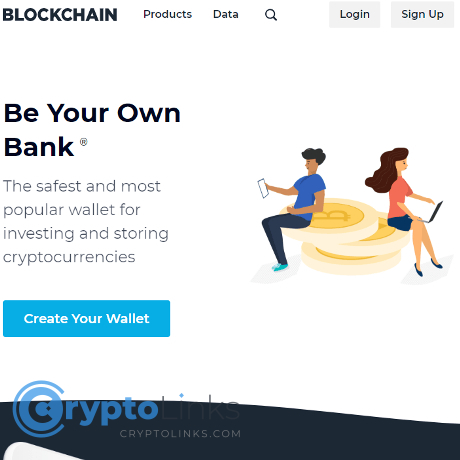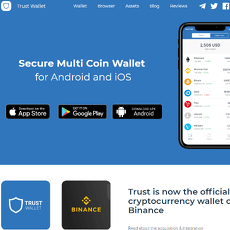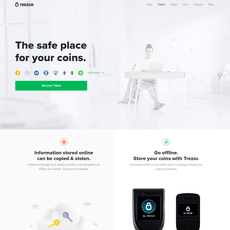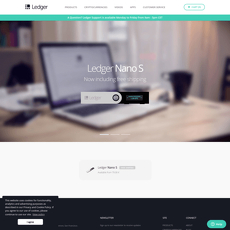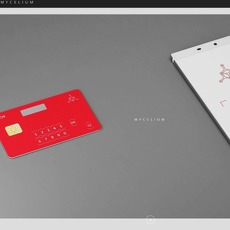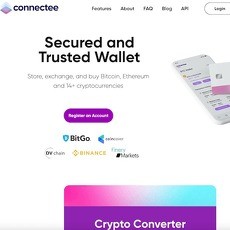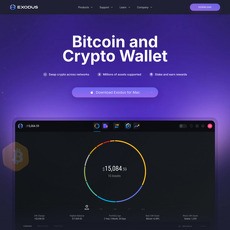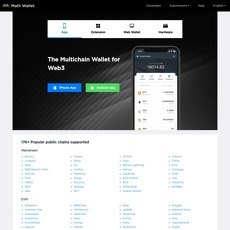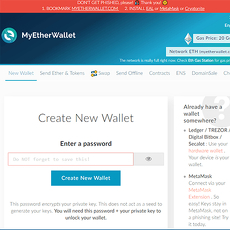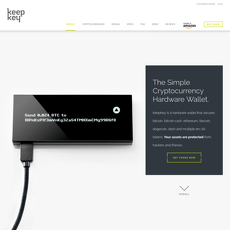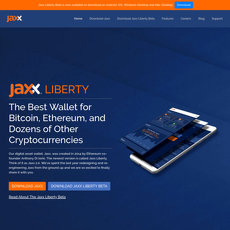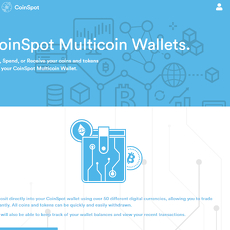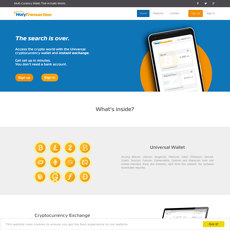Blockchani Wallet Review
Blockchani Wallet
blockchain.info
Blockchain Wallet Review Guide: Is It Really Worth Your Crypto?
Ever found yourself staring blankly at countless crypto wallets wondering: "Is Blockchain Wallet really the safest and easiest place to store my coins?" You’re definitely not alone.
Every crypto investor or trader I speak with struggles with the same wallet concerns. You want your crypto safe. You want easy transactions. And most importantly, you don't want surprise costs creeping up later.
Why Choosing a Crypto Wallet is Harder Than it Seems
Have you ever opened a crypto wallet hoping it’s just as easy as a bank app, only to find it's overly complicated or cluttered with confusing options? Choosing the right crypto wallet can be overwhelming due to:
- Security Fears: Nobody wants to wake up to an emptied digital wallet. According to crypto security firm CipherTrace, wallet-related thefts and hacks totaled hundreds of millions of dollars in recent years—so, naturally, safety tops the list of concerns.
- Usability Issues: Ever installed a wallet app but got frustrated halfway through onboarding? Ease-of-use is often overlooked in crypto products. In fact, a confusing UX design was found to be one of the top reasons why people abandon cryptocurrency apps.
- Sneaky Hidden Fees: Have you ever initiated a crypto transaction thinking it was going to be cheap, only to realize afterward fees ate up a chunk of your coins? No one enjoys hidden transaction charges or unexpected expenses.
Let's Clear Those Doubts Once and for All
Blockchain Wallet has attracted tons of attention, touting itself as reliable and easy for Bitcoin, Ethereum, and more. But are those claims actually backed by users' experiences?
You're probably wondering: Is Blockchain Wallet secure enough to trust with your crypto? Is it user-friendly enough for everyday use? How transparent is their fee structure compared to others?
I get these questions from my readers constantly—and they're absolutely important. To save you time and confusion, this guide tackles each question head-on.
Quick Overview: What's Coming Up?
In this comprehensive review guide, we'll explore every critical aspect you need to confidently say "yes" or "no" to Blockchain Wallet:
- Security: How protected your crypto actually is with Blockchain Wallet.
- Usability: Is their wallet truly as easy as they claim?
- Fees & Costs: An honest look into Blockchain Wallet’s pricing—no surprises later.
- Supported Cryptocurrencies & Platforms: Find out exactly what coins and devices Blockchain Wallet supports right now.
- FAQs & Everyday Concerns: Clear answers to your most burning questions.
Most crypto users have heard of Blockchain Wallet, but surprisingly few actually have the full story. Want to find out for yourself if it's the right wallet for your crypto needs? Let's start with the basics—
So, what exactly is Blockchain Wallet, and what coins does it support in 2025? Let's take a closer look...
What Exactly is Blockchain Wallet?
If you're new to the crypto world or have been around for some time, I'm sure you've noticed the name Blockchain Wallet popping up everywhere. But let's stop guessing and break this down in the simplest way possible, so you finally know what everyone's fussing about.
Quick Background of Blockchain Wallet
Blockchain Wallet first launched way back in 2011—practically ancient history in the crypto universe. Operated by the famous Blockchain.com, it quickly became one of the leading online crypto wallets due to its simplicity and reliability.
Over the years, it evolved substantially from its modest beginnings as a pure Bitcoin storage solution to the robust wallet it is today. Fun fact: By 2023, it reached over 85 million wallets created worldwide. Now, that's what I call a wallet with reach!
"Good products become great once they listen to users and adapt over time." — Facebook Co-Founder, Dustin Moskovitz
Blockchain Wallet seems to follow this philosophy closely. Each update brought improvements, including more security, better interfaces, and wider crypto compatibility. There's a reason its popularity soared—users felt heard and protected.
Supported Cryptocurrencies: Is It Bitcoin Only or Does it Support Ethereum, Ripple, and More?
Here's the real talk—Blockchain Wallet supports more than just Bitcoin now. Yes, back in the day it got famous as a Bitcoin wallet (because Bitcoin was pretty much the only famous cryptocurrency back then!) but now you can confidently store various cryptos like:
- Bitcoin (BTC) - Obviously the king crypto
- Ethereum (ETH) - Yes, Ethereum holders, you are welcome.
- Bitcoin Cash (BCH) - Bitcoin's sibling, popular amid niche communities
- Stellar (XLM) - Blockchain.com introduced Stellar support back in 2019, exciting investors of this fast, low-cost crypto.
- Tether (USDT) and other stablecoins - handy when volatility gives you heartburn.
Sadly, if you're hoping to see Ripple (XRP), Cardano (ADA), Solana (SOL) or a few other popular altcoins on the list—sorry—they aren’t supported just yet. Trust me, you're not alone if you're disappointed with this particular limitation.
Supported Platforms and Devices: What About Your Phone?
One major reason Blockchain Wallet’s popularity keeps growing? It perfectly fits today's always-on-the-go lifestyle. Whether you love trading from your laptop or simply checking balance on your daily commute, Blockchain.com has your back:
- Web version accessible via your browser (so you don't need downloads)
- Mobile apps for both Android and iOS, regularly updated and user-friendly
- No desktop app yet but web interface works smoothly without hassle.
Personally, I found the mobile app super convenient—an easy-to-use interface designed keeping regular users in mind rather than crypto-techies only. It's easy enough for beginners and still handy enough for seasoned traders.
But before you jump in headfirst, let's pause and think: is wallet usability enough, or should we be digging deeper into security and features to decide? Keep reading, because next I'll tackle exactly these points—which features are crucial to consider when picking your crypto wallet, and whether Blockchain Wallet really checks all these boxes or misses some crucial bits.
Key Features of Blockchain Wallet You Should Know About
Let's get straight to the point. Blockchain Wallet is popular, trusted by millions, but does it have enough powerful features to earn your attention? Crypto users care about usability, security, managing their coins efficiently, and making exchanges on the fly. I've personally taken Blockchain Wallet for a spin, testing every corner to reveal what truly matters.
Easy and User-Friendly Interface
Quick question: Imagine opening your wallet and easily seeing your crypto balance without getting dizzy? That's exactly the kind of simplicity Blockchain Wallet promises.:
- Intuitive Dashboard: Your cryptos displayed clearly, no confusion, with your total crypto balance on sight.
- Transactions made easy: Sending crypto is as straightforward as sending a text-message, allowing even crypto newcomers to send funds smoothly.
- Clear design, zero clutter: Unlike some wallets loaded with confusing charts and technical jargon, Blockchain Wallet keeps everything refreshingly minimal and honest.
According to a recent study by Deloitte, simplicity and ease-of-use in digital financial services significantly boost user satisfaction and loyalty. Blockchain Wallet knows this: pleasing your experience keeps you coming back.
Security Options and Reliability
Let's face the painful truth: every crypto holder feels a slight shiver each time they log into their wallet, wondering "Is my crypto truly secure?" Blockchain Wallet tries to comfort those fears through features like:
- Two-Factor Authentication (2FA): Not just an option—it's strongly recommended. Adding this extra layer shields your account from unwelcome guests.
- Backup Phrase Encryption: Lost your device? No sweat. Blockchain Wallet lets you restore your wallet with a secure 12-word backup phrase, putting you fully in control.
- Private Key Access: Unlike wallets that hold your keys hostage, Blockchain Wallet gives you full ownership and direct access to your private keys, ensuring you control your funds entirely.
"Security is not a product, but a dynamic process." — Bruce Schneier, Security Technologist and Author.
I couldn't agree more. And Blockchain Wallet seems to believe this too, continuously updating their security protocols to match evolving threats.
Multiple Cryptocurrency Management
If you're like me and hold more than just Bitcoin, you'll appreciate a wallet that's versatile enough to manage several cryptocurrencies at once. Thankfully, Blockchain Wallet checks this box:
- Multi-Crypto Support: Bitcoin (BTC), Ethereum (ETH), Bitcoin Cash (BCH), Stellar (XLM), and even some additional popular cryptos are supported, making it flexible enough for broader portfolio needs.
- Seamless Conversion: Managing several cryptos doesn't need to feel like a juggling act. The wallet simplifies the management of multiple cryptos clearly with an easy-to-use interface.
No more headaches or juggling multiple wallets.
Integrated Exchange Feature
One of the secrets of successful crypto trading is acting fast when opportunities appear. That's exactly what Blockchain Wallet enables with its built-in exchange:
- Instant Crypto Trades: Blockchain Wallet partners with top exchanges to provide real-time crypto-to-crypto trades without leaving your wallet.
- Competitive Exchange Rates: Built-in exchanges usually mean inflated fees, but like the bold folks at Blockchain, fees and rates are kept transparent and competitive.
- No More Annoying Transfers: No need to move your cryptos back and forth between wallet and exchange. All your trading happens safely and conveniently within one secure place.
This powerful combo of wallet and built-in exchange streamlines daily crypto activities without disruption.
You're probably wondering, is Blockchain Wallet perfect, or are there elements missing under all this shine? That's exactly what I'll answer next. Curious to know the drawbacks and unique strengths every wise crypto holder should be aware of? Get ready to explore what truly matters—and what could be deal-breakers—in the next part.
Pros and Cons of Blockchain Wallet: Is It Really Worth Your Crypto?
Let's face it—no wallet out there is perfect. Blockchain Wallet certainly boasts a huge following, but popularity doesn't always mean it's the right choice for everyone. So let's get real for a moment and take an honest look at both the advantages and disadvantages from my personal experience and what other users say.
Pros Users Quickly Appreciate
Here are some positives that users often rave about when they describe their experience with Blockchain Wallet:
- User-Friendliness and Simplicity: Blockchain Wallet nails it when it comes to giving a smooth and intuitive experience. Lots of crypto newcomers find its minimalistic interface less scary than more complicated wallets.
- Established Company With a Solid Reputation: With millions of users globally—and counting—Blockchain wallet didn't appear overnight. Time-tested reliability matters, trust me. According to numerous user feedback reports, the wallet indeed benefits from steady improvements.
- Easy Exchange Integration: The in-built swap function lets you easily trade Bitcoin, Ethereum, and other supported cryptocurrencies within the wallet itself. You won’t have to log into external exchanges constantly—a big plus for trading enthusiasts.
- Multi-Platform Accessibility: They’ve nailed cross-platform compatibility—included are Android, iOS, and web versions; so wherever you go, your Blockchain Wallet is right there with you.
"Design is not just what it looks like and feels like. Design is how it works." – Steve Jobs
Areas Where Blockchain Wallet Needs Improvement
No wallet platform is without downsides, and Blockchain Wallet is no exception. Here are some key areas I've noticed—and many users have pointed out—that still require attention:
- Limited Cryptocurrency Support: One of the main drawbacks I've encountered is how limited their crypto variety is. Although popular coins like BTC and ETH are well-covered, altcoin lovers might find themselves left out in the cold. If actively trading newer or less-common tokens is your game, Blockchain Wallet might disappoint your adventurous crypto spirit.
- Occasional Slow Customer Support: Picture that sinking feeling when you're waiting for an answer about your funds—or a crucial transaction—hoping someone responds quickly. Occasionally, Blockchain Wallet’s support team is slower to reply than users anticipate. A responsive support team is precious in any crypto scenario, and improvements could definitely be made here.
- Fees Can Be Confusing at Times: Blockchain wallet transaction fees aren't unusually high, but the lack of clarity about when exactly certain fees apply can surprise users. Hidden fees, even small ones, feel frustrating. Transparency and simple fee structures matter a lot if you're moving crypto frequently.
So, weighing these pros and cons carefully brings us to perhaps the biggest concern most crypto users have—security. You might have already wondered yourself, "Is Blockchain Wallet truly secure enough to trust with my crypto assets?"
The answer might surprise you, and I'll share all the key insights and analysis next. When your hard-earned crypto is on the line, it's something you absolutely can’t afford to skip. Curious?
Security Analysis: Can You Really Trust Blockchain Wallet?
It's easy to talk big about security—especially in crypto. After all, we're dealing with digital assets, and you need solid confidence that your crypto won't suddenly vanish overnight. So let's answer the main thing that's probably hovering in your mind right now:
How Safe is Blockchain Wallet, Really?
Blockchain Wallet takes security seriously, no doubt about it. Here are the most important protective features you’ll find:
- Two-factor authentication (2FA): An extra step to verify it’s really you during logins and transactions. Studies show wallets with 2FA enabled reduce account breaches significantly.
- Backup passphrase: You get a recovery phrase to regain access if you lose your password or device, giving you peace of mind—even during stressful times (like losing your phone).
- Private key management: Your private keys are stored securely, encryption standards are solid, and they're never directly exposed or shared externally.
- Device verification: New or unknown devices accessing your account face extra verification hurdles for additional safety layers.
When you break it down, Blockchain Wallet clearly checks important boxes any crypto owner would require. Yet, is its history completely spotless?
Past Hacks or Security Breaches
No crypto wallet is completely immune to threats, but Blockchain Wallet has remained notably resilient over the years. As of writing this review, there haven't been significant public disclosures of direct breaches or hacks compromising users' crypto or sensitive data.
This doesn't mean issues can't arise—security threats evolve constantly in crypto. However, Blockchain Wallet’s solid track record shows they have proactively prevented large-scale issues from impacting their users on a meaningful level up to now.
"Security isn't about being hack-proof—it's about continuously outsmarting threats." — Anonymous Cybersecurity Expert
How to Enhance Your Blockchain Wallet Security
Sure, Blockchain Wallet is inherently pretty secure—but there's always room to step up your security habits personally. Here’s what you should absolutely consider doing:
- Always Activate 2FA: Just enable it now—this single decision dramatically lowers your risk.
- Use Unique Passwords: Mixing numbers, letters, and symbols stops hackers dead—in fact, strong passwords prevent 80% of DDoS and hacking attempts according to cybersecurity studies.
- Secure your Recovery Phrase Carefully: Write it down offline on paper somewhere safe. Blockchain Wallet can't recover your crypto if your phrase is lost or stolen.
- Avoid Public Wi-Fi Networks: It's tempting, I know! But open connections are hackers' favorite playgrounds—stick with secure Wi-Fi for wallet access.
- Be Careful of Phishing Attacks: Blockchain Wallet won't ever suddenly ask for your sensitive data outside official channels. Always triple-check site URLs before entering login credentials.
At the heart of wallet security lies a critical combination of technological measures and personal responsibility. Blockchain Wallet has done their part—now it’s your turn.
Feeling relieved about their safety measures? Good. But what about fees—are you paying hidden costs just to keep your crypto protected? Let's discover what Blockchain Wallet charges next, and determine whether your trust comes with a fair price or hidden surprises.
Fees and Costs Explained: Hidden or Fair?
Let's talk money—because nobody likes surprises when it comes to wallet fees. Let's strip away the confusion and see how Blockchain Wallet stacks up.
Blockchain Wallet Transaction Fees
So here's the deal: Blockchain Wallet markets itself with transparency, but what's the reality?
- Sending & Receiving: Blockchain Wallet itself doesn't take a cut when you send or receive crypto. Instead, you're paying network fees directly to blockchain miners. The catch? Network fees can fluctuate, especially with Bitcoin or Ethereum during peak hours. For example, in 2023, during busy periods, Bitcoin's average transaction fees peaked at around $30 per transaction. That's steep!
- Exchange Fees: If you swap cryptos using their built-in exchange system, Blockchain Wallet charges fees varying roughly between 0.5% and 1%. To put that in real-world perspective, exchanging $500 of Ethereum to Bitcoin could cost you $5. Doesn't sound terrible—but if you swap cryptos frequently, it can add up significantly.
"Transparency is everything, especially in crypto—hidden fees can feel like betrayal."
Comparing Blockchain Wallet Fees vs Other Wallets
So, how fair are these fees compared to the broader wallet market? Let's check real-world examples:
- Coinbase Wallet: Coinbase typically incurs network fees plus a Coinbase transaction fee (around 1.49%). Compared to Blockchain Wallet, Coinbase fees usually pile up quicker, making Blockchain Wallet competitive on swaps.
- Exodus Wallet: Exodus has flexible network fees (adjustable), but exchange fees via their integrated ShapeShift exchange can range from 2% to 5%! Clearly, Blockchain Wallet looks wallet-friendly here.
- Trust Wallet: Known for low cost and high flexibility, Trust Wallet charges only network fees (no hidden fees). But it lacks the user experience and easy on-ramp Blockchain Wallet provides, especially if you're just getting started.
At the end of the day, fees matter a lot—but they're just part of the puzzle. So the question naturally pops up:
Are there other hidden costs or wallet quirks you should worry about with Blockchain Wallet? Don't worry, I'll reveal all these juicy details next—keep reading to find out!
Common Questions Answered: What Users Really Want to Know
Ever found yourself stuck with your Blockchain Wallet and spending hours googling answers, only to find outdated or confusing solutions? Trust me, you're not the only one. Let's finally sort out those common questions users like you run into all the time.
How Do I Withdraw Funds from Blockchain Wallet?
There's nothing worse than feeling uncertain when you're moving crypto funds—especially your hard-earned profits. With Blockchain Wallet, withdrawing is quick and easy, just follow these simple steps:
- Log into your Blockchain Wallet and head over to your dashboard.
- Select the cryptocurrency you want to withdraw (Bitcoin, Ethereum, etc.).
- Click the "Send" button and then paste your chosen external wallet address.
- Enter the amount—double check keeping an eye on transaction fees!
- Lastly, ensure everything is correct and confirm the transaction.
Remember: Triple-check your wallet address! Crypto transactions can't be reversed once sent.
"It's not your crypto until it's safely in your wallet." — Andreas M. Antonopoulos
Can I Store Ethereum and Other Altcoins in Blockchain Wallet?
Absolutely! However, there's a catch. While Blockchain Wallet does support Ethereum and popular ERC-20 tokens, it's not the most extensive wallet out there. For example, Ripple (XRP), Cardano (ADA), or more obscure altcoins aren't currently supported.
If you're heavily into altcoins, you might feel a bit limited here. I'll share some top-notch alternatives that could better fit your needs as we go further.
Is Verification Required and Why?
If you're new, the "KYC" (Know Your Customer) issue can sometimes be frustrating or seem invasive. Blockchain Wallet requires verification mainly to comply with regulations and protect against fraud or illegal activities.
- Unverified account: Limited transaction limits and features.
- Verified account: Higher limits, enhanced security, and additional wallet functionalities.
Verification does protect you in the long run—I get it, nobody likes giving personal data away, but it's essentially meant to safeguard your digital assets.
Solving Common Technical Problems Quickly
Let's be real: tech hiccups are as common as market swings in the crypto space. Here's how I usually troubleshoot the most frequent headaches Blockchain Wallet users run into:
- "I Can't Log In!": Attempt a quick password reset. Didn't help? Clearing your browser cache often does the trick, or just switch browsers.
- "Transaction is Stuck or Pending Forever": Network congestion could be the issue. Try raising your transaction fee a bit next time, or simply wait a few hours.
- "Wallet Balance Isn't Updating": Check your transaction ID on a blockchain explorer to confirm the transaction status. If it's successfully confirmed but your wallet doesn't show it, a quick logout and login will usually solve the issue.
Still don't see your problem listed? Keep calm; try reaching out to Blockchain Wallet's customer support—you’re never alone in this digital wild west.
Want to know which wallet alternatives may better handle tricky issues or support more cryptocurrencies? Stick around, because next I'll share some wallet options and useful resources you absolutely shouldn't miss.
Recommended Resources and Alternatives for Blockchain Wallet Users
Choosing the best crypto wallet isn't always as straightforward as we'd like—luckily, you're never stuck with just one option. Let's check out a few fantastic alternatives worth your attention, plus some trustworthy resources I've personally found invaluable.
Other Wallets Worth Checking Out
Blockchain Wallet isn't your only game in town—far from it—and knowing your alternatives can make all the difference. After reviewing countless wallets, here are a few solid, reliable choices to consider:
- Exodus Wallet: Super intuitive interface, ideal if you prefer convenience and design. Supports tons of cryptocurrencies and even has a built-in exchange—perfect for beginners and crypto-pros alike.
- Ledger Nano S/X: Widely praised hardware wallets offering top-notch security through offline storage (cold storage). If your priority is keeping your cryptos bulletproof-secure, Ledger is an easy recommendation.
- MetaMask: If you're active on decentralized apps (dApps) and Ethereum-based platforms, MetaMask is basically your best friend. Available as a handy browser extension and mobile app, it integrates seamlessly with DeFi platforms.
- Trezor Model T & One: Another excellent hardware wallet brand, offering simple design and impressive security. Trezor wallets are user-friendly, reliable, and highly recommended by security-conscious crypto holders.
- Trust Wallet: Owned by Binance, Trust Wallet is an excellent choice for mobile users, allowing you to store a wider variety of altcoins and participate easily in staking. Bonus points: it's completely decentralized and non-custodial.
Each of these wallets shines in particular areas, whether it's security, usability, coin support, or ease of integration. Think about your unique needs—security preference versus convenience, beginner friendliness versus advanced options—and give them a closer look. Remember, it's smart to diversify your crypto storage methods rather than relying entirely on any single wallet.
Useful Guides and Resources
Want more in-depth, credible insights into crypto wallets and security? Here are some resources I trust and recommend exploring to sharpen your crypto skills:
- Crypto Wallets Guide: Your go-to resource to quickly compare different wallet types, see reviews, features, pros, and cons.
- Trezor Academy & Support Hub: Trezor offers extensive educational material on crypto security and best wallet practices.
- Ledger Academy: A great walkthrough of cryptocurrency basics, wallet setup guides, security tips, and more.
- MetaMask Support & Guides: MetaMask’s official resource covering setup steps, frequently asked questions, and advanced tutorials.
- Ethereum.org official wallet comparison: A handy table for Ethereum wallet comparison straight from the source.
These guides cover everything from quick-start wallet setup tutorials to in-depth security advice—helping you confidently manage, secure, and grow your crypto holdings.
But now I have to ask you—considering all these great alternatives, is Blockchain Wallet the ideal pick for everyone, or does it fit specific users better? Don't miss the next part, where I'll break down the exact situations Blockchain Wallet suits best and give you my honest opinion about whether it's your ideal wallet choice for 2025.
Final Verdict: Should You Use Blockchain Wallet in 2025?
I know choosing the right wallet feels like stepping into a maze, especially with so many options flooding today's crypto space. So, let's cut straight to the chase—after all my digging and testing, here's the straight-up truth about Blockchain Wallet in 2025.
Who Would Benefit Most from Using Blockchain Wallet?
If you're someone relatively new to crypto, or if convenience and simplicity matter more to you than handling endless tech details, you might genuinely appreciate Blockchain Wallet. Here's why:
- Beginner-friendly: Its clear, streamlined interface makes getting started with Bitcoin, Ethereum, and a few other popular cryptos really easy, even if you've never touched digital coins before.
- Quick setup and reliable performance: If you're not looking for complexities—just a basic, stable ride to manage your crypto—Blockchain Wallet genuinely delivers. It reliably meets the common crypto transaction needs without complications or fuss.
- Integrated swapping and exchange: If you're someone who occasionally trades or quickly swaps coins within your wallet, you'll find the integrated exchange capability a real timesaver.
Overall, it's a decent "starter" option or an easy-going pick for those who prefer simplicity above all else.
Situations When It's Best to Try Alternatives
But let's be honest, Blockchain Wallet isn't everyone's cup of tea. I've personally seen some clear scenarios where you're probably better off choosing another wallet instead:
- You’re holding diverse altcoins: If your portfolio is deeper into altcoins beyond the handful Blockchain Wallet supports—like Solana, Avalanche, Cardano, or meme coins—you'll quickly run into limitations here. In this situation, a broader, multi-coin wallet like Exodus or Atomic is more effective.
- You're security-obsessed: Blockchain Wallet has decent protection (2FA and solid encryption), but it isn't a hardware wallet. If peace of mind and top-tier security is priority #1 for you—especially for larger crypto amounts—you should move toward industry-leading hardware wallets like Ledger or Trezor, which are far more bulletproof against hacks.
- Frequent traders watching fees closely: Blockchain Wallet offers convenience but not always the most competitive transaction fees compared to alternatives such as Trust Wallet or Coinbase Wallet. Hardcore traders or frequent swappers can definitely find wallets offering better cost-efficiency in the long run.
My Honest Recommendation
Here's the bottom line from my perspective: Blockchain Wallet isn't perfect, but it definitely has a place in 2025. Its strength lies in simplicity, reliability, and ease of use, especially for beginners or casual crypto holders who value quick-and-easy interactions. The popularity and long-established trust behind Blockchain.com as a platform also adds a sense of reassurance for newcomers.
But if you’re a serious crypto investor holding larger sums, stacking diverse altcoins, or you’re particularly sensitive about security—you can do considerably better elsewhere. Hardware wallet solutions or wallets with broader coin support might suit your needs much better.
To sum it up, Blockchain Wallet is a solid pick if you're new or casually involved in crypto, but more advanced or active crypto enthusiasts might find stronger competitors to suit their bigger dreams and demands.
Ultimately, choosing a wallet always comes down to what suits your crypto style and priorities best. Keep those in mind, stay informed, and you’ll confidently pick the option that's right for YOU. Happy crypto adventures in 2025!

